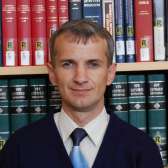
"Holocaust in Transnistria: The Interplay between Central, Regional, and Local Romanian Authorities"
Professional Background
Igor Niculcea is Senior Lecturer in the Department of Philology and History and the Chair of History and Social Sciences at Cahul State University (Moldova). He received a B.A. in world contemporary history from the National University of Odessa (Ukraine) and is currently a Ph.D. candidate in world history there. For his Yetta and Jacob Gelman Fellowship on the Holocaust in Romania, Mr. Niculcea conducted research for his project “Holocaust in Transnistria: The Interplay between Central, Regional, and Local Romanian Authorities.”
Mr. Niculcea is the author of scholarly articles on the Romanian administration of Transnistria during World War II, including “Illegal Ukrainian Irredentism in Transnistria (1941-1944) in Ukrainian Historical Journal (2007); “Religious Education in Transnistria during the Romanian Administration (1941-1944)” in Literatura ta Cultura Polissya (2004); and “Romanian Administration in Transnistria (1941-1944): Sources and Historiography” in Zapiski Istoricheskogo fakultetu (1997). He is the recipient of many grants and scholarships, including an internship with the Academic Staff Mobility Program, Erasmus Mundus External Cooperation Window Program, financed by the European Commission, a research grant from the Ministry of Foreign Affairs in Romania, and an Individual Mobility Grant through the Tempus TACIS Program. He has language skills in Romanian, Russian, and Ukrainian.
Fellowship Research
During his tenure at the Center, Mr. Niculcea researched the Holocaust in Transnistria. Divided between the Ukraine and Moldova today, Transnistria was administered by Romania during World War II. Mr. Niculcea’s work brings to light the issues of the Holocaust in Eastern Europe where denial and avoidance have often been paramount. Through his project he sought to fill the void in Ukrainian historiography on the Holocaust in Transnistria. He focused on the role of the Romanian civil and military administrations in Bucharest and Transnistria in dealing with the Jewish question, the initiative to move the Transnistrian Jews farther East, and the role of various Romanian authorities in the incitement of the local populations against the Jews. Mr. Niculcea used the Museum’s extensive archival holdings from Romania, the Ukraine, and Moldova, as well as published sources to complete his research.
Mr. Niculcea was in residence at the Mandel Center from October 1, 2009 to April 30, 2010.
